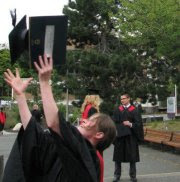Astrology is only as illogical as my childhood belief that trees created wind. The system, a complicated one, does not come from nowhere. It is based on an Aristotelian cosmology adopted and adapted by the Arabian intellectuals, from whom I believe we acquired astrology somewhere in the 12th century renaissance. When the Aristotelian cosmology was replaced this was not because it was 'hockie superstitution,' but on the good scientific reason of it simply not having as efficient predictive powers when you treated the planets on a spherical orbit as an elliptical one. Astrology was a necessary cost of adopting a more efficient astronomical theory.
I studied Galileo. I did not understand. I know that the Church held certain views. I know that Galileo was one of those men who stood up and said, 'you cannot hold to this, you cannot let it become dogma. It will be your downfall. I beg you. I love my church, please do not say a thing that may show you as fallible.' This in itself might be presumptuous enough to get you dead, but that was not it. That is how it is told in the play of Bertolt Brecht and in the history we read and they do not mention that what Galileo said shatters whole cosmologies.
Galileo was not killed for his work but he was imprisoned, censored, and ultimately died in silence having renounced what he believed to be true. He is considered a martyr of science. He isn't, because he did not die for it. He renounced it and lived to work in secrecy. He is not a martyr and although I respect his practicality I am disgusted by his failure to hold to what he held to be true. We die. It cannot be helped. For goodness sakes die for something if you can!
For Aristotle and as such for most all of the medieval tradition there were two realms. There was a superlunary and the sublunary. The sublunary is earth. Earth is mutable, changing, subject to birth and decay. Earth is imperfection at the center of a perfect universe. Past the vapours of the earth is the moon, the first superlunary body. All superlunary bodies are perfect, never-changing, and divine. The thing of it is the Catholic church still had bits of paganism in it, the worst of them being Aristotle. All we need do is remember that these are people who still worshiped the stars. It is never mentioned. There is a bit of talk about the need for earth to be at the centre of God's plan, but it is never mentioned that these are people who looked at the stars as holy bodies. The Arabic philosophy, which bleeds into western thought, considers them manifestations of God. It was believed that beyond the earth moved the heavenly spheres. These perfect bodies moved on crystalline tracks and made music unheard by any human creature; it was sometimes said that the animals could hear the music, especially birds and nighttime things.
So Galileo's science destroyed one of the last holding places of pagan belief. It forced the acceptance of one more thing not infested with spirits, not alive, not meaningful. Of course they fought him! Of course they were angry!
Tuesday, April 27, 2010
Subscribe to:
Post Comments (Atom)






No comments:
Post a Comment